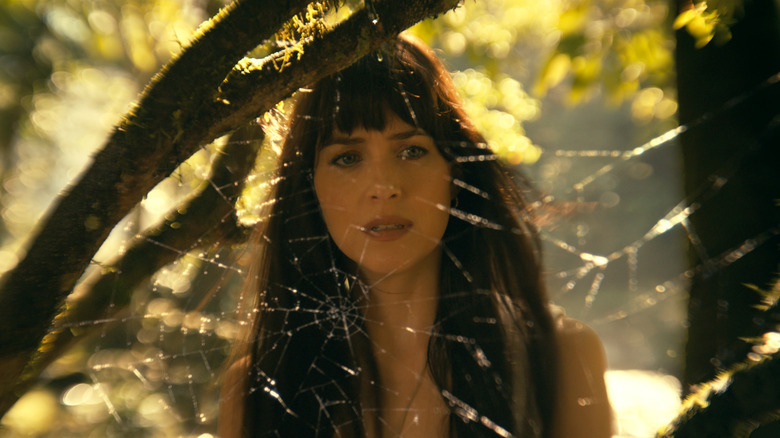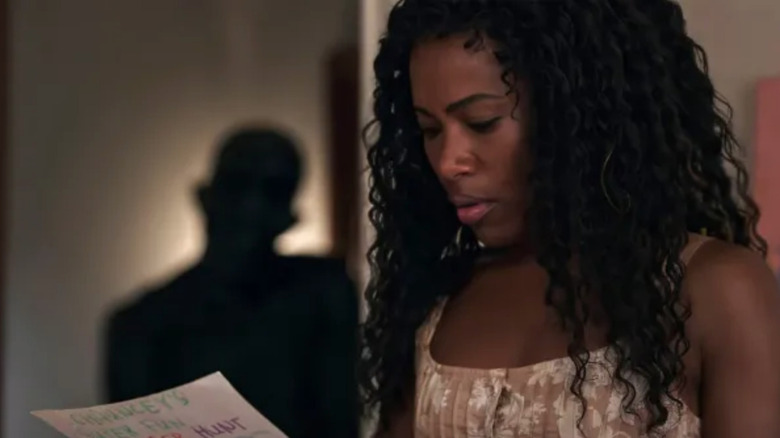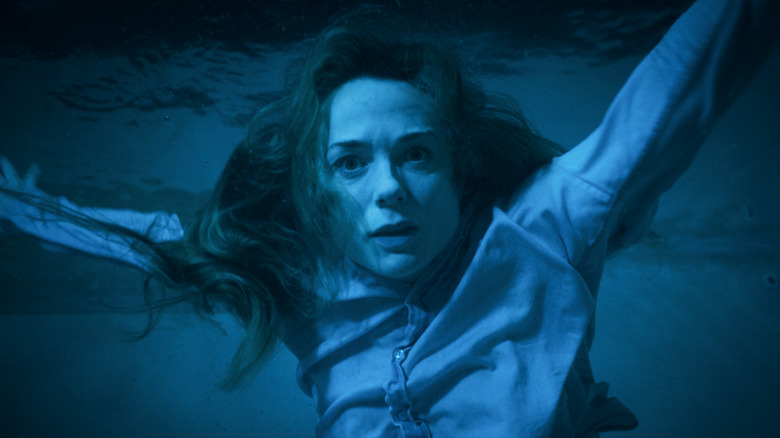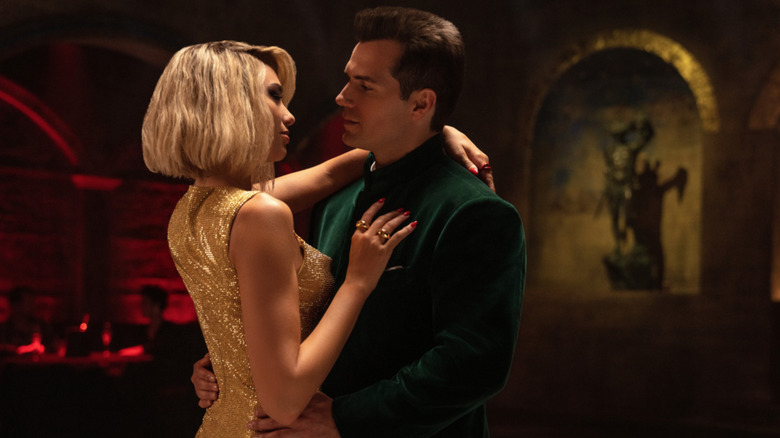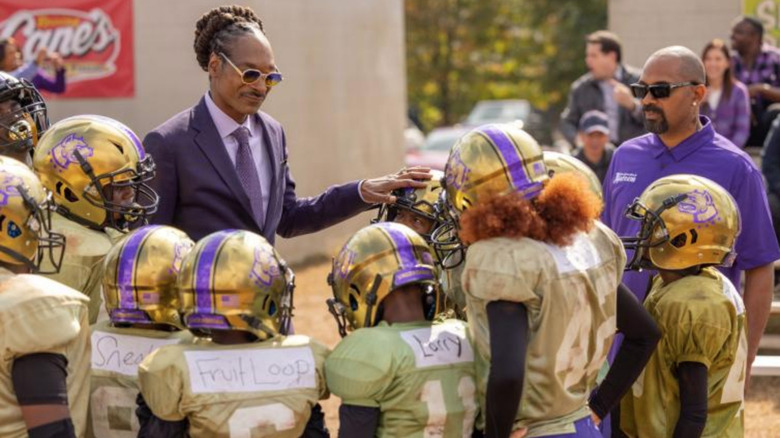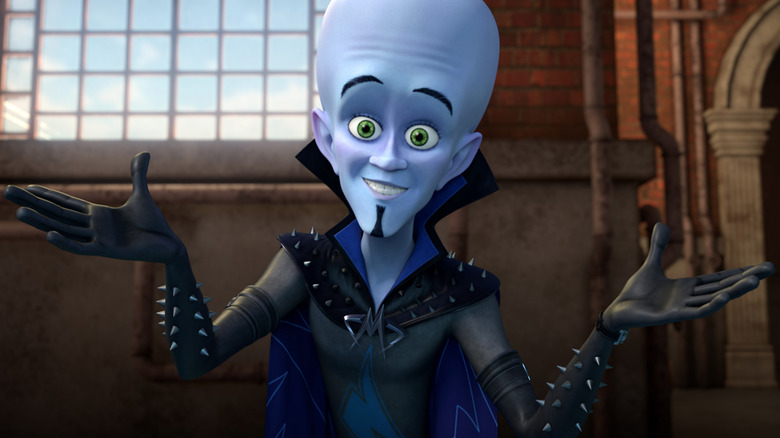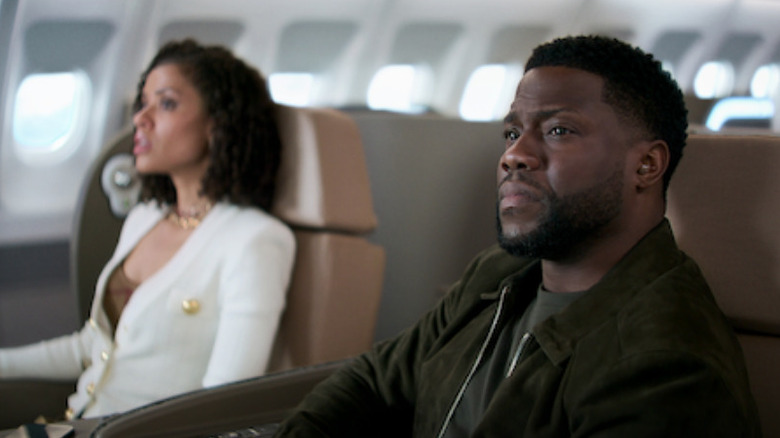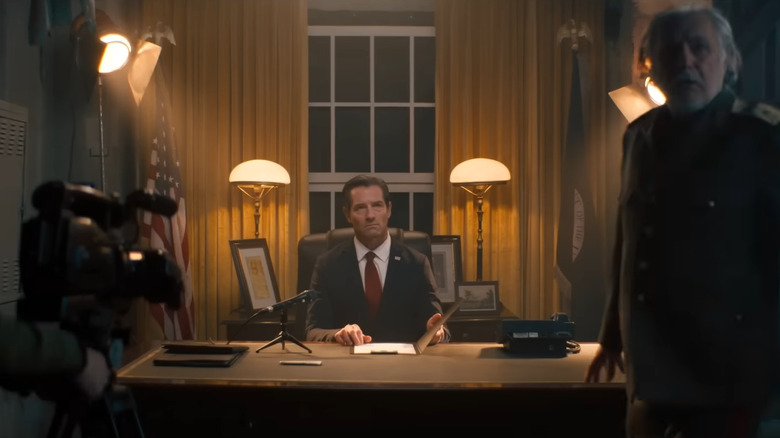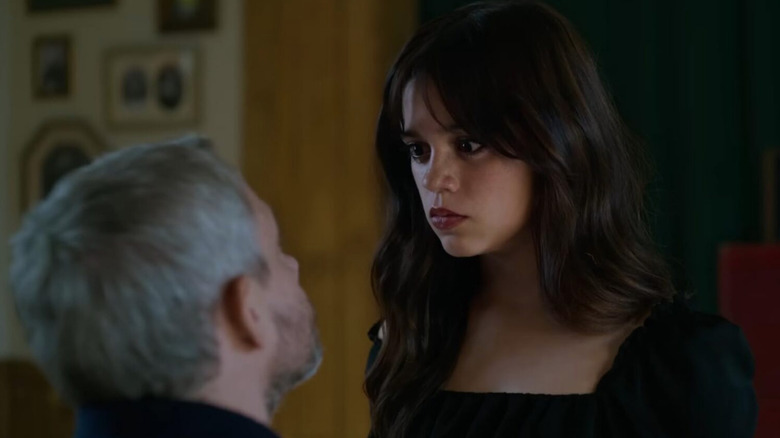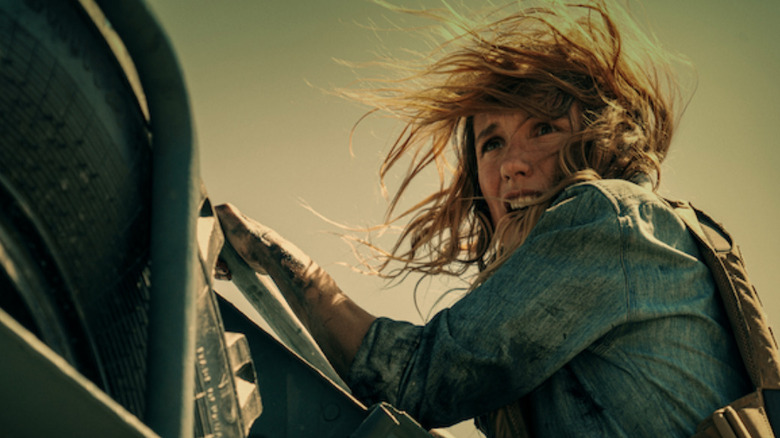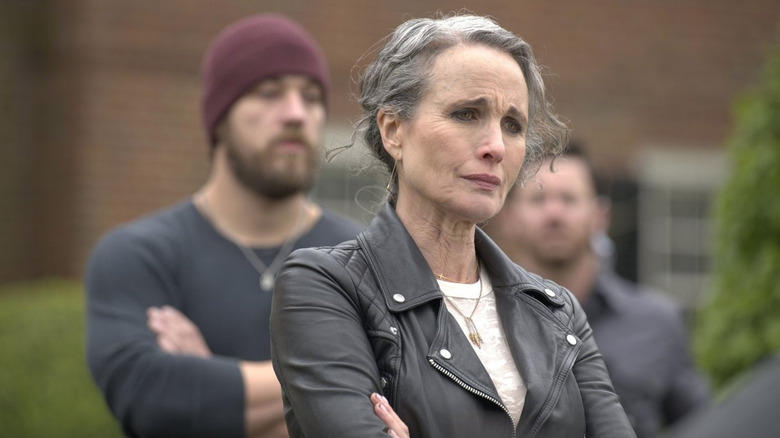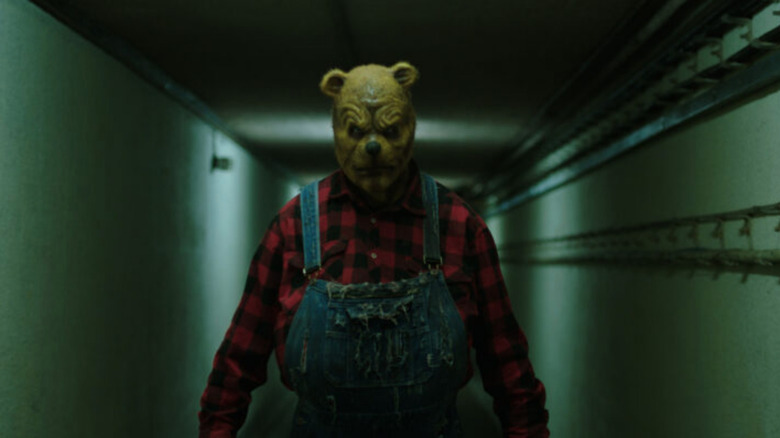The Worst Movies Of 2024 So Far
After a stellar year for movies in 2023, morale has been high among moviegoers for another solid year of noteworthy hits. As we make our way through 2024, we've been spoiled with an abundance of choices across theatrical and direct-to-streaming releases, but as we all know, quantity does not guarantee quality. While there have undoubtedly been some truly remarkable movies worthy of acclaim this year (see our Best Movies of 2024 list), it's inevitable that alongside these standouts, there would also be a fair share of cinematic disappointments.
From lackluster and forgettable to downright disastrous and unwatchable, these movies serve as cautionary tales for what happens when there's a blatant disregard for decent storytelling and audience intelligence. The entries on this list were by no means chosen lightly. Based on internet chatter, respected critics' takes, review aggregate sites, and our own opinions, these worst of the worst 2024 movies overwhelmingly failed to captivate audiences and critics alike.
Madame Web
Perhaps the most relentlessly criticized movie of the year so far, Sony Pictures' "Madame Web" has been dubbed the worst addition to Sony's Spider-Man Universe and, even more harshly, the worst comic book movie yet. This standalone superhero tells the origin story of Cassie (Dakota Johnson), a paramedic with newfound clairvoyant abilities, who races to protect three young women from a sinister figure who seeks to exploit their latent superpowers. The execution, however, is forgettable at best and an insult to the audience's intelligence and time at worst.
In a blatant cash grab and failed effort to keep a faltering franchise afloat, it was easy for audiences to see right through this lifeless, expositional, clunky mess. Even the cast themselves couldn't take the movie seriously, unable to salvage the lackluster material, with forced performances and uninspired dialogue. In Looper's review of "Madame Web," Alistair Ryder called it "a film that arrived fully formed as a cultural punching bag." From the lazy writing to the stilted editing, "Madame Web" offers little beyond fodder for internet memes.
Imaginary
Not scary enough for horror fans and too flat and predictable to pass as a psychological thriller, Jeff Wadlow's "Imaginary" joins his Blumhouse trifecta of disappointments, where his directorial touch seems to create mediocrity at best. (Wadlow also directed "Truth or Dare" and "Fantasy Island" for the horror studio.) The premise of a childhood imaginary friend seeking revenge after abandonment seems promising enough, but in reality, audiences were left wishing for a much more imaginative approach. The reliance on cheap scares, tedious storytelling, and recycled ideas detracts from what could have been a compelling exploration of childhood trauma and strained stepparent and child relationships.
The consensus among audiences and critics reflects the film's shortcomings, evidenced by its 1.9 rating on Letterboxd and 34 Metacritic score. Wilson Chapman of Indiewire aptly encapsulated the overarching sentiment in their review with a clever quip, writing, "Just like your childhood imaginary friend, you'll probably forget about it pretty quickly." The only thing worse than "Imaginary" is the fact that it isn't the only Blumhouse blunder of the year.
Night Swim
In 2014, Bryce McGuire and Rod Blackhurst's short film "Night Swim" went viral on YouTube. One decade later, McGuire made his feature directorial debut with the same story that broke him into the industry. Produced by horror's biggest production companies, Blumhouse Productions and Atomic Monster, this haunted pool flick is as absurd as it sounds, proving that a bigger budget and longer runtime don't automatically make a story better.
When the central conflict of the movie can be resolved simply by avoiding a dip in the swimming pool, it becomes challenging to view the stakes with any sort of seriousness. It also doesn't help that the film is overstuffed with tired clichés and watered-down scares, with Owen Gleiberman of Variety writing, "everything is as telegraphed as it is derivative. The film's fear factor is all wet." Its pitiful ratings of 1.8 on Letterboxd and 43 on Metacritic underscore just how bland and uninspired this failed attempt at horror truly is.
Argylle
From the acclaimed director of the highly successful "Kingsman" franchise, Matthew Vaughn, "Argylle" was a failed attempt to sustain his momentum in the spy action genre. With a star-studded ensemble cast, Vaughn's distinctive signature flair, a whopping $200 million budget, and a promising premise centered around a recluse author (Bryce Dallas Howard) whose fictional work mirrors a real-life spy organization and their mission, expectations were obviously high. However, most were let down by the film's lengthy runtime and a convoluted plot that felt more like a drawn-out parody of its clear inspirations.
Scoring a 35 on Metacritic and a 33% on Rotten Tomatoes, it was clear critics would spare "Argylle" no mercy in their scathing reviews. Peter Bradshaw of The Guardian likened the film to a superficial men's magazine cover shoot: "thin, flimsy, lumbered with a dull meta-narrative and dodgy acting, and boasting a blank parade of phoned-in cameos from the supporting cast." Katie Walsh of The Los Angeles Times went even further, labeling it "one of the most expensive worst movies ever made" and suggesting that it "should be studied in a lab." Although audiences were more lenient, granting it a 72% audience score on Rotten Tomatoes, the film's poor box office performance provides a more telling indication of moviegoers' true feelings.
Mea Culpa
Tyler Perry's films are often hit or miss, although they mainly lean toward the latter. While his previous Netflix venture, "A Jazzman's Blues," hinted at a potential shift in the right direction, "Mea Culpa" disappoints as a noticeable regression for the writer-director-producer. The legal drama about Chicago-based lawyer Mea Harper (Kelly Rowland) chronicles her familial turmoil and professional dilemmas as she navigates a complex web of deceit, betrayal, and desire that comes with taking on the controversial case of charismatic artist Zyair Malloy (Trevante Rhodes). While it succeeds as a familiar Perry-esque guilty pleasure, it falls flat on almost every other front.
With a 1.8 rating on Letterboxd, audiences are in agreement that "Mea Culpa" lacks the suspense, stakes, or sex appeal needed to pull off the kind of erotic thriller it's going for. Beyond the sheer boredom it provokes, the cringe-inducing dialogue and acting might just lead you to consider canceling your Netflix subscription. Benjamin Lee summed it up well in The Guardian, writing, "The stupidity of it all is certainly diverting but it's all too scattershot and at times stiflingly portentous to cross over into pure camp."
The Underdoggs
Snoop Dogg's sports comedy "The Underdoggs" was prophesized to fail the moment it skipped its planned theatrical release and went straight to streaming. In this Prime Video exclusive, has-been football player Jaycen "Two Js" Jennings (Snoop Dogg) finds redemption and rekindles his passion for football when he coaches his community youth football team in his hometown, ultimately transforming both the team and himself. If you think you've seen something similar before, it's because you probably have.
"The Underdoggs" accomplishes a fusion of inspirational sports drama and R-rated comedy but brings nothing new to the table for either genre. Brandon Yu of The New York Times observed, "It can't come up with any memorable jokes or genuine heart to fill in the beats that it mostly slogs through." While Snoop Dogg brings his signature charm to the role of Jaycen, his performance feels restrained, lacking the energy and charisma needed to elevate such a project. As a result, "The Underdoggs" ends up feeling like a watered-down imitation of better sports movies that have come before it, failing to leave a lasting impression despite its star power and genuine laugh-out-loud moments.
Megamind vs. The Doom Syndicate
With its awful IMDb rating and single-digit Rotten Tomatoes score, "Megamind vs. The Doom Syndicate" may be the worst example of an animated sequel ever to see the light of day. While its memeified 2010 predecessor captured audiences with its fresh and humorous take on the superhero genre, the sequel butchers any sense of originality and charm with a 14-years-late downgrade. Kicking off the Peacock television series "Megamind Rules!," "Megamind vs. The Doom Syndicate" sees the return of Megamind (now voiced by Keith Ferguson, as Will Ferrell didn't return) as the supervillain faces a crisis when his former menacing crew, the Doom Syndicate, challenges his hero status and threatens to launch Metro City to the moon.
Writing for RogerEbert.com, Nell Minow remarked the movie "is intermittently funny and briefly heartwarming, as though they ran the original through the washing machine a few times, and then faxed it." Still, director Eric Fogel defended the final outcome and blamed its shortcomings on a significantly smaller budget than the first. Beyond the disregard for the original's characterization, plot, and humor, the most glaring, cheapened element of the movie is by far the poor-quality animation, robbing it of its bare-minimum entertainment value and strengthening our distaste for this trend of lazy franchise reboots, remakes, and sequels.
Lift
The Kevin Hart-led, F. Gary Gray-directed heist comedy "Lift" is a stark reminder of Hollywood's tendency to churn out content solely for profit, often at the expense of originality. In this cheap-looking, copy-paste heist film, a seasoned thief (Hart) and his former Interpol agent love interest (Gugu Mbatha-Raw) join forces to lead a diverse crew in orchestrating a daring heist aboard a passenger plane mid-flight.
"Practically every scene is a cliché, every line of dialogue an echo of a better one you've already heard in a better film," Michael Nordine wrote in a review for Variety. Netflix seems to be the main offender here, releasing the same formulaic movies year after year — "Lift" follows in the unremarkable footsteps of other forgettable Netflix original action-comedies like "The Out-Laws," "Coffee & Kareem," and "Red Notice." Netflix obviously recognizes there's an audience for these kinds of movies ... but who, exactly? That we're still trying to figure out. Even Kevin Hart fans may struggle to find merit in his uncharacteristically serious and devoid-of-humor performance within this disappointingly predictable offering.
Air Force One Down
If given the choice between being cramped in a middle seat on a budget airline or sitting through 80-plus minutes of the action thriller "Air Force One Down," you're better off picking the former for the sake of your sanity. Katherine McNamara from "Shadowhunters" and Ian Bohen from "Yellowstone" star in this B-grade movie about a rookie Secret Service agent (McNamara) tasked with saving the President's (Bohen) life after an attempted hijacking of Air Force One. It's the type of mind-numbing movie you watch for the pulse-pounding action and high-stakes suspense, but "Air Force One Down" can't even deliver on those fronts.
The premise is far-fetched enough, but once you actually get into the movie — a low-effort hijacking of one of the world's most secure aircraft and a petite rookie agent fending off hordes of towering terrorists — the suspension of disbelief required becomes too much to bear. On his blog, critic Dennis Schwartz said of the movie, "The routine B-film is written by Steven Paul as if he fell out of the plane's emergency door and was still writing on his way down." Nonsensical and too boring to watch as a "so bad it's good" guilty pleasure, "Air Force One Down" crashes and burns as one of the worst movies to come out of this year.
Miller's Girl
In the erotic thriller "Miller's Girl," 18-year-old Cairo Sweet (Jenna Ortega) seeks inspiration for her Yale admission essay by seducing her teacher, Jonathan Miller (Martin Freeman), leading to a scandal that forces both mentor and student to confront their inner demons. The 30-year-plus age gap between the two leads takes viewers back to a time in cinema many of us hoped we'd never have to revisit. Between "Poison Ivy" and "The Crush," the '90s popularized the underage femme fatale trope, but not without sparking their own fair share of controversy. The question is why writer-director Jade Halley Bartlett felt the need to revitalize this trope in such a superficial way while introducing a new generation of moviegoers to these dangerous and tired narratives that distort the roles of predator and victim by portraying adult men as victims of manipulation by sexually self-aware minors under the guise of empowerment and agency.
Luckily, audiences aren't biting. With a 1.9 rating on Letterboxd, many reviewers compare the writing to amateurish Wattpad fanfiction. Critics aren't holding back, either. Brian Lowry of CNN wrote, "Dated and creepy in all the wrong ways, it's a movie that might have escaped derision in the 1980s but deserves to get slapped around today." Lacking nuance, originality, and depth, "Miller's Girl" is a misguided debut that fails to capture the complexity of its themes.
The Wages of Fear
Despite the 1953 thriller "The Wages of Fear" achieving enduring classic status, marked by its impressive box office success in France and prestigious awards at the 1953 Berlin and Cannes Film Festivals, Netflix's 2024 remake directed by Julien Leclercq stands as a stark example of one of the worst remakes ever to exist. Following the same premise as the original, a group of unlikely allies race against time to transport volatile cargo through treacherous desert terrain in an effort to avert disaster. Even without watching the original, one could imagine the palpable suspense and tension that made this thriller so influential.
However, while everyone knows that in order to justify a remake, you have to maintain the core essence of the original while offering something fresh and new, Netflix's French remake "The Wages of Fear" disregards all of that and dilutes everything meaningful about the original. At the time of its release, "The Wages of Fear" has become one of Netflix's most popular titles worldwide, but that doesn't mean audiences are liking it. Instead, the overall consensus acknowledges "The Wages of Fear" as a lazily thrown-together direct-to-streaming remake stripped of any meaning and suspense.
Red Right Hand
The action-packed thriller "Red Right Hand" is yet another mindless, derivative VOD genre film. Taking place in the gritty Appalachian town of Odim County, "Red Right Hand" follows rough and tough Cash (Orlando Bloom) confronting his past as a ruthless enforcer for the sadistic kingpin Big Cat (Andie MacDowell), pushing him to desperate measures to protect his niece (Chapel Oaks) and his newfound semblance of family.
Although the film's two seasoned leads, plus Garret Dillahunt, and standout newcomer Oaks try their best with the material they're given, not even they can elevate this predictable and familiar formula of overused tropes offset by distracting violence. Critic Frank Scheck for The Hollywood Reporter also quibbled with the casting, writing, "Bloom is perfectly fine as the stalwart, soft-spoken hero seeking revenge, but MacDowell never proves remotely convincing as the ruthless female baddie." Audiences on Letterboxd have rated it 2.8 overall, whereas critic reviews on Metacritic even out to a mixed-to-average score of 48. While the captivating action sequences might offer some visual appeal, true fans of the genre will realize this overly lengthy thriller for what it really is — a generic and forgettable film.
Irish Wish
Lindsay Lohan is back and better than ever. However, the same can't be said about the movies she's choosing to star in. After signing a multi-picture deal with Netflix, the fantasy rom-com "Irish Wish" marks Lohan's second project with the streaming service. Lohan plays Maddie, a book editor secretly in love with a bestselling author (Alexander Vlahos), and luckily, a magical encounter with a wish-granting fantastical figure (Dawn Bradfield) turns Maddie into the dashing author's bride-to-be.
One big cliché for the expression "Be careful what you wish for," the film does little to enhance or subvert its well-trodden genre. While all the praise for this film lands on Lohan's shoulders, it pretty much stops there. Samantha Bergeson of IndieWire described the movie as "cute yet very forgettable," while Benjamin Lee noted in their review for The Guardian that Lohan's "creep back to mainstream movies needs expediting with another junky Netflix offering that feels beneath her talent." The film, packaged as an escapist comfort watch that dropped around St. Patrick's Day, is an easy skip in a year filled with so many other great films to watch.
Winnie-the-Pooh: Blood and Honey 2
Director Rhys Frake-Waterfield is in the business of ruining everyone's childhoods by taking beloved children's properties and turning them into gruesome and terrifying slasher films. "Winnie-the-Pooh: Blood and Honey 2" is, as the name suggests, the sequel to the maligned slasher film "Winnie-the-Pooh: Blood and Honey" and the second installment in Frake-Waterfield's developing Twisted Childhood Universe. In this Winnie-the-Pooh horror reimaging, A.A. Milne and E.H. Shepard's original characters, Winnie-the-Pooh (Ryan Oliva), Piglet (Eddy MacKenzie), Tigger (Lewis Santer), and Owl (Marcus Massey), band together on a murder spree in Christopher Robin's (Scott Chambers) hometown of Ashdown in their ongoing revenge against Christopher, who abandoned them when he went off to college in the first film.
With a tenfold increased budget, aspects of the sequel improved from the first, most notably the character designs, but those small upgrades aren't enough to save this disaster of a film overly reliant on its conceptual gimmick. While fans of splatter horror with no substance may be satisfied, by refusing to fully embrace its innate campiness, the film undermines itself through an overly serious approach and a sloppy, unrealized story. As a result, the majority of moviegoers find this one hard to sit through, as reflected by its meager 2.7 rating on Letterboxd and a dismal 36 on Metacritic. However, despite being lambasted by critics and audiences, the characters of "Winnie-the-Pooh: Blood and Honey" will live to kill another day, as Frake-Waterfield is already developing more childhood-ruining spin-offs and sequels.

